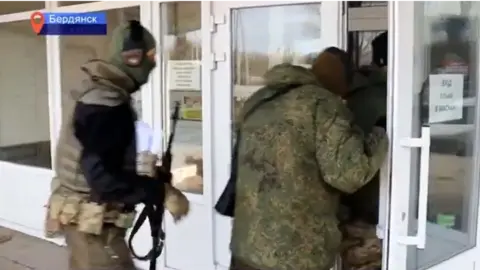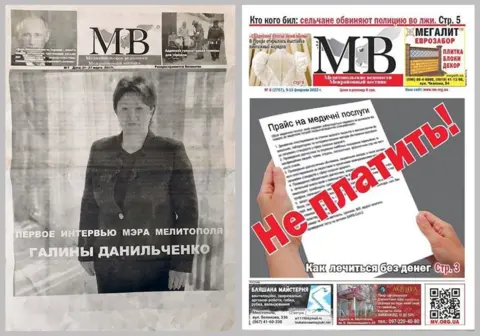Ukraine war: How Russia replaces Ukrainian media with its own
 Rodnoi Krasnodon
Rodnoi KrasnodonSerhiy Starushko and his journalist colleagues had just finished their morning editorial meeting in early March when Russian military vehicles drew up outside.
Within minutes, soldiers stormed through the front doors of the three-storey building, home to a local news station in the occupied Ukrainian port city of Berdyansk.
About 50 employees were held hostage for five hours.
They had become victims of the real-world fight to control the flow of information.
Russian forces are occupying towns, threatening journalists and demanding they spread pro-Kremlin views. Those who refuse are forced to close down their operations.
The strategy to replace Ukrainian media with pro-Kremlin press coverage includes capturing transmitter towers and switching off access to national Ukrainian news programmes in areas controlled by Russian forces. Instead, signals for pro-Russian broadcasts are switched on.
The State Special Communications Service of Ukraine told the BBC that eight stations are being used to air "propaganda and disinformation" to the local population in southern Ukraine.
In Berdyansk, Serhiy - a broadcast journalist - was forced to lie on camera and announce he was declaring a war against so-called ''Ukrainian nationalists". The Russians said they would post this coerced declaration online if he refused to co-operate.
"There were armed people everywhere, a few dozen of them, and I think five to six of them were from the FSB [Russian security service]. They said, 'now it's Russia, and if you want to live, you'll have to co-operate'," recalls Serhiy, now safely out of the region.
For him and his colleagues, "co-operation" meant demands to divulge the contacts of local pro-Ukrainian activists and soldiers, and air pro-Russian propaganda. These were not empty threats.
 Serhiy Starushko
Serhiy Starushko"They took me to a separate room. They started beating me on my head, chest, legs, they were beating me with their knees and palms, so there were fewer bruises," he says, recalling the incident.
"Then one of them threatened me with a gun: he held it to my head and genitals. They asked me if I wanted to call my wife to say 'goodbye' to her."
The next day, Russian TV channels showed a video claiming to show the capturing of the station - but the building was already empty when they turned up with cameras. The Russian reporter said the army had to take control of the station because it was spreading "disinformation about the situation in the city".
It was the last functioning Ukrainian broadcasting company in Berdyansk. Another company was also shut down; national broadcasting has been cut off.
Before the invasion, residents in the region could watch dozens of national Ukrainian channels - and a few local ones - but these have since been blocked.
Unless they have a satellite dish, citizens in occupied cities now only have access to 24 Russian state TV channels and those channels broadcasting from self-proclaimed republics in eastern Ukraine.
"It's just fake news, I don't even want to watch it. They're brainwashing people," says 28-year-old Anna (not her real name), who still lives in Berdyansk. She only watches a music channel and relies on limited access to the internet for reliable news.
And now a Crimea-based channel has launched news bulletins for residents in what Russia calls the "liberated areas" of the south of Ukraine.
There's no mention of a war. Journalists claim "the life in the region has improved with the arrival of the Russian forces", and these areas "have real prospects to get out of the crisis created by the Ukrainian authorities".
"This is a key part of the Russian strategy. Because information warfare is always a part of a real war," explains Natalia Vyhovska, from the Ukrainian Institute of Mass Information.
"They start broadcasting Russian TV, they threaten independent journalists. They come with weapons to their newsrooms, their houses and their parents' houses."
The same tactics were also employed when Crimea was invaded in 2014, according to Reporters Without Borders, an organisation that supports press freedom.
But as well as hijacking the airwaves, Russians are producing imposter content - as Mykhailo Kumok, who owns a media company in the southern Ukrainian city of Melitopol, discovered.
After the Russian forces took over the city, five armed officers knocked on his door. They confiscated his laptop and computer, and took Mykhailo and his wife to their base - for a "conversation".
 Mykhailo
MykhailoThey asked him why his media company called the Russians "occupiers". Mykhailo replied, what else should he call them?
"They started talking about so-called 'de-Nazification' and I replied, 'I'm a Jew, I'm a Russian-speaking Jew - so why did you come here? For me, you're nothing but occupiers'."
Mykhailo says he wasn't going to co-operate with the Russians and publish their propaganda, so he decided to shut down both his newspaper and website. But he was shocked when he saw a fake newspaper with his company's branding being delivered to locals.
"That was a fake newspaper with terrible printing, but with our logo. On the first page there was a portrait of the mayor installed by Russia, a small portrait of Putin and a picture showing the occupiers helping those in need."
 Mykhailo Kumok
Mykhailo KumokOne of the articles said the Russian authorities would lower gas prices, write off all bank debts and temporarily cancel all tax payments.
Unrealistic pledges which echo those made by Russia in annexed Crimea in 2014.
"That time they also promised the residents [they would] write off credit debts, return their savings - but nothing happened," says Eugen Fedchenko, chief editor of StopFake, a fact-checking organisation specialising in tackling Russian propaganda and fake news.
"That's why most Ukrainians understand that all these promises are just empty words."
Mykhailo agrees. He is concerned that propaganda such as the fake newspaper may influence older people, but most, he says, will look at what happened when Russian forces invaded Crimea and backed separatist forces in eastern Ukraine in 2014.
"People here won't blindly believe the [Russian] media. First of all, they'll ask themselves, 'has my life become better or worse since the Russian troops invaded?' And life here has certainly become worse - almost for everyone."
